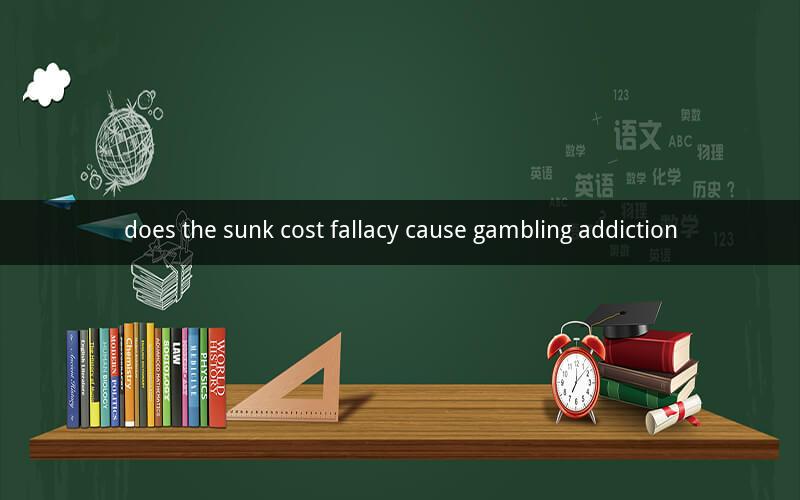
Table of Contents
1. Introduction to the Sunk Cost Fallacy
2. Understanding Gambling Addiction
3. The Intersection of Sunk Cost Fallacy and Gambling Addiction
3.1 The Role of Sunk Costs in Gamblers' Decisions
3.2 The Psychological Impact of Sunk Costs on Gamblers
4. Case Studies and Examples
5. The Role of Society and Environment
6. Prevention and Treatment Strategies
7. Conclusion
1. Introduction to the Sunk Cost Fallacy
The sunk cost fallacy is a cognitive bias that leads individuals to continue investing in a project, endeavor, or activity because they have already invested a significant amount of time, money, or effort. This fallacy often results in irrational decision-making, as the past investment does not justify the future costs or benefits.
2. Understanding Gambling Addiction
Gambling addiction, also known as compulsive gambling, is a behavioral addiction characterized by an inability to control the urge to gamble despite negative consequences. It affects individuals across various demographics and can lead to severe financial, social, and psychological problems.
3. The Intersection of Sunk Cost Fallacy and Gambling Addiction
3.1 The Role of Sunk Costs in Gamblers' Decisions
Gamblers often fall victim to the sunk cost fallacy, as they continue to play or bet because they have already lost money. The belief that they must recoup their losses leads to further gambling and a deeper spiral into addiction. This behavior is driven by the psychological need to avoid the regret of wasting the initial investment.
3.2 The Psychological Impact of Sunk Costs on Gamblers
The sunk cost fallacy exacerbates the psychological distress associated with gambling addiction. Gamblers may feel trapped in a cycle of hope and despair, as they continue to play in the hope of winning back their losses. This constant pressure to recoup their sunk costs can lead to increased anxiety, depression, and a heightened sense of urgency to gamble.
4. Case Studies and Examples
Several case studies have illustrated the relationship between the sunk cost fallacy and gambling addiction. For instance, a study published in the Journal of Behavioral Addictions found that individuals with gambling problems were more likely to exhibit the sunk cost fallacy when making decisions about their gambling behavior.
5. The Role of Society and Environment
The societal and environmental context plays a crucial role in the development and perpetuation of gambling addiction. Factors such as easy access to gambling venues, marketing strategies, and the normalization of gambling as a leisure activity can contribute to the problem. Additionally, individuals who grow up in environments where gambling is prevalent may be more susceptible to developing gambling addictions.
6. Prevention and Treatment Strategies
Several strategies can be employed to prevent and treat gambling addiction related to the sunk cost fallacy:
- Education and Awareness: Raising awareness about the risks of gambling and the sunk cost fallacy can help individuals make more informed decisions.
- Cognitive-Behavioral Therapy (CBT): CBT can help individuals recognize and challenge their irrational beliefs, such as the sunk cost fallacy, and develop healthier coping mechanisms.
- Support Groups: Joining support groups, such as Gamblers Anonymous, can provide individuals with a sense of community and support while they work through their addiction.
- Regulation and Intervention: Governments and organizations can implement stricter regulations on gambling and provide intervention programs to help those struggling with gambling addiction.
7. Conclusion
The sunk cost fallacy is a significant factor in the development and maintenance of gambling addiction. By understanding this cognitive bias and its impact on gamblers, we can develop more effective prevention and treatment strategies. It is crucial to address both the individual and environmental factors that contribute to gambling addiction to create a healthier and more informed society.
---
Questions and Answers:
1. Q: What is the sunk cost fallacy?
A: The sunk cost fallacy is a cognitive bias that leads individuals to continue investing in a project or activity because they have already invested a significant amount of time, money, or effort.
2. Q: How does the sunk cost fallacy contribute to gambling addiction?
A: The sunk cost fallacy contributes to gambling addiction by causing individuals to continue gambling in the hope of recouping their losses, despite the negative consequences.
3. Q: Can the sunk cost fallacy be overcome?
A: Yes, the sunk cost fallacy can be overcome through education, cognitive-behavioral therapy, and support from friends, family, and professionals.
4. Q: What are some signs of gambling addiction?
A: Signs of gambling addiction include preoccupation with gambling, lying about gambling activities, using gambling as a way to escape problems, and experiencing financial, social, and psychological distress.
5. Q: How can society help prevent gambling addiction?
A: Society can help prevent gambling addiction by implementing stricter regulations on gambling, raising awareness about the risks, and providing support for those struggling with addiction.
6. Q: What role does marketing play in gambling addiction?
A: Marketing can play a significant role in gambling addiction by normalizing gambling and promoting it as a fun and exciting activity, which can make it more appealing to individuals who may be susceptible to addiction.
7. Q: Can gambling addiction be treated?
A: Yes, gambling addiction can be treated through various methods, including cognitive-behavioral therapy, support groups, and intervention programs.
8. Q: How can individuals seek help for gambling addiction?
A: Individuals can seek help for gambling addiction by contacting a mental health professional, joining a support group, or seeking assistance from organizations dedicated to helping those with gambling problems.
9. Q: What is the importance of early intervention in gambling addiction?
A: Early intervention is crucial in gambling addiction as it can prevent the condition from worsening and help individuals regain control over their lives.
10. Q: How can family and friends support someone with gambling addiction?
A: Family and friends can support someone with gambling addiction by offering empathy, encouragement, and help in seeking professional treatment or support groups.